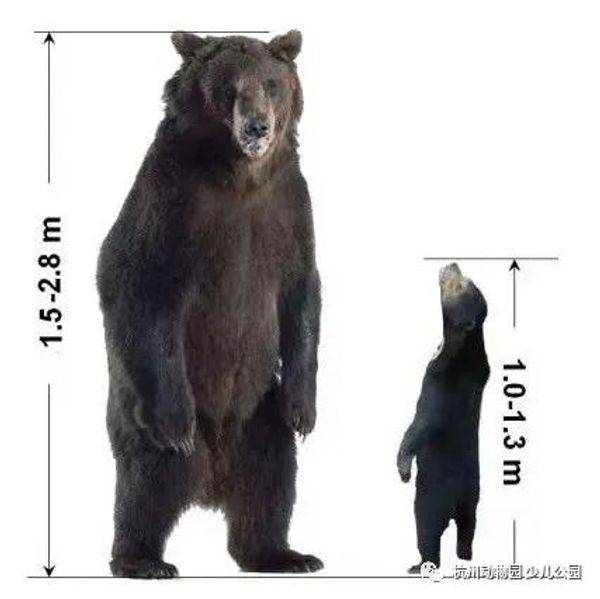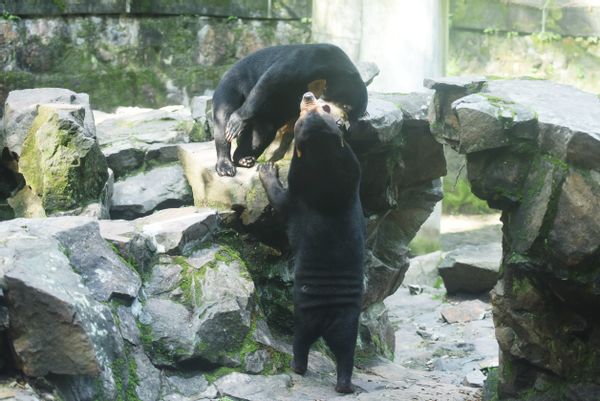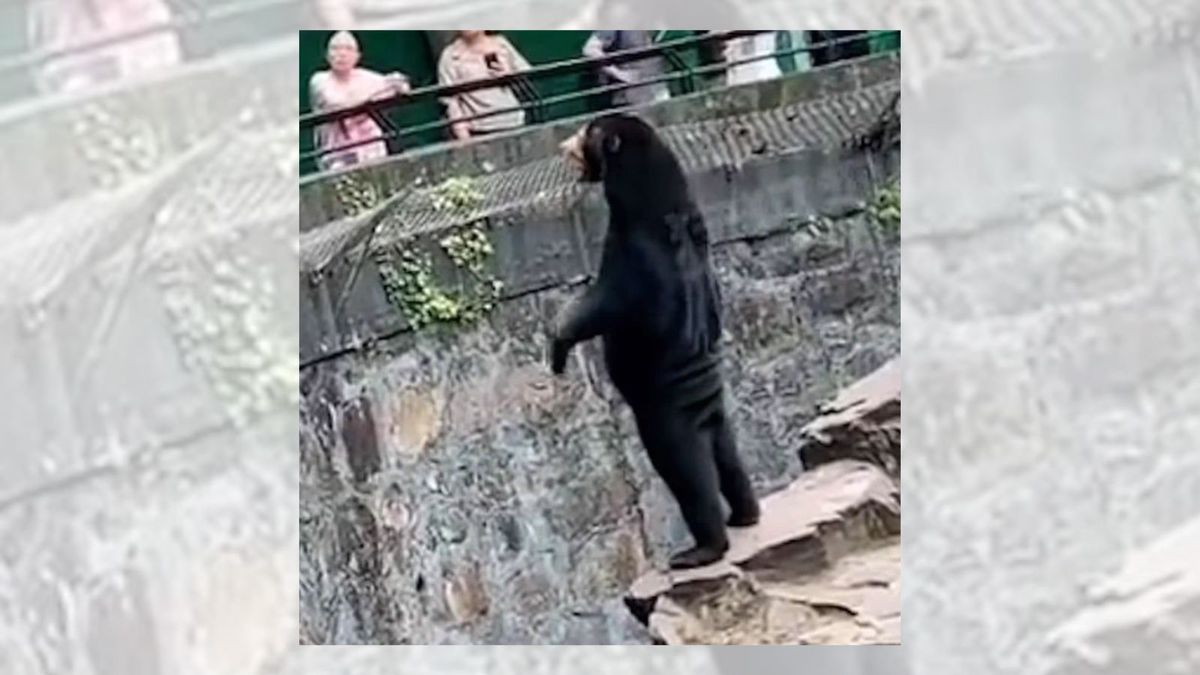The video indeed showed an animal — the sun bear, which is the smallest bear in the world — at China's Hangzhou Zoo.
In late July 2023, social media users on English and Chinese-speaking social media platforms debated whether a viral video of a what appeared to be a bear inside a zoo exhibit was a hoax. Instead of an animal, some users believed, the clip showed a person wearing a bear costume and pretending to be the mammal. They cited its seemingly human-like movements, such as standing and attempting to catch snacks from onlookers, as evidence.
"Real bear? Or man in costume?," one social media user asked, another said that the creature seemingly "stands like a person."
A Chinese Zoo has attempted to convince visitors that this is a real bear.
After this video went viral in China the zoo stated this was in fact a real sun bear.
Real bear? Or man in costume? 🐻 pic.twitter.com/oUPBMfZGVp
— Oli London (@OliLondonTV) August 1, 2023
The viral video was authentic footage of a bear. In other words, it was not digitally manipulated or edited in an attempt to fool viewers into believing something happened that did not. No bear costume here.
The video was recorded at Hangzhou Zoo, which is in China's Zhejiang providence.
After the false bear-costume rumor gained popularity, the zoo confirmed in a post on WeChat, a Chinese social media app, that the subject of the video was a sun bear named Angela. We used Google Translate to translate the post, which was written supposedly from Angela's perspective under the title, "I'm working hard, but someone suspects that I'm looking for a substitute?" The post read:
Here's the thing:
My name is Angela the Sun Bear. Yesterday, after I got off work, I received a call from the director, asking me if I was lazy and did not go to work, so I hired Twolegs to replace me.
Unexpectedly, I was sitting in the mountains, and hot searches fell from the sky. Some people think that I am popular when I stand up. It seems that you don't know me too well. Think about it, there were tourists who thought I was petite and not a bear! Let me emphasize again: I am a sun bear! Not a black bear! Not a dog! It's a sun bear!
Hangzhou Zoo underscored in the WeChat post some distinct characteristics of sun bears, which are the smallest bear species in the world.
When it comes to bears, the first thing that comes to mind must be a huge figure and amazing strength.
Our bear family belongs to beasts. The power of bear paws cannot be underestimated. It can smash the back of a cow or smash a car. But not all bears are huge and dangerous personified. Our sun bear is petite, the smallest bear in the world.
What's more, the zoo published an image showing a size comparison between small sun bears and far more recognizable American black bears:

(Hangzhou Zoo Children's Park on WeChat)
Hangzhou Zo's WeChat post continued:
Our bears all belong to the Ursidae family, which is mainly divided into three subfamilies, namely the giant panda subfamily, the spectacled bear subfamily and the ursinae subfamily. Our sun bears belong to the Ursinae, and our other brothers are brown bears, American black bears, polar bears, Asiatic black bears, and sloth bears. The body structure of our bear family is that we can stand on our hind legs, and so are the other brothers!
Our hair is a jet-black short down, very shiny, our eyes are small, and our ears are also small. We also have a tail, but the tail is very small, about the same length as the ears.
In the Getty Images' photograph below, you can see sun bears are not small in relation to their surroundings, but the colors of their back fur make the shape of a frown. Some social media users cited this fact in their debates over whether the viral video showed an animal or not, saying it was "a human in a suit."

(Getty Images)
The zoo underscored that sun bears are not only able to stand — a characteristic that inspired social media users' false assumption that the in-question creature was actually a human — but they also have a particularly long tongue and a heightened sense of smell:
In addition to being able to stand, I have a lot of little secrets to tell you.
I also have a specialty, that is, the tongue specialty. Our tongue is one of the longest in the bear family, up to 30 cm long. In order to eat sweet honey, it has evolved an indestructible long tongue covered with rough barbs. With a light stretch, the termites in the hole can be swept away smoothly.
Our sense of smell is very sensitive, more than 100 times stronger than that of humans, and we can bark like dogs.
Also, we don't hibernate. It's not that the zoo keeps us open, because our hometown is in a warm tropical area, so we don't have the habit of hibernating.
Given that the Hangzhou Zoo confirmed the creature in the viral video was a sun bear, and there appeared to be no logical reason for the facility to lie about that fact, we have rated this claim as "Miscaptioned."
Various news outlets, such as BBC, CNN, and The Guardian, covered the internet's amusement over the video. Moreover, Chao News reported visitor numbers at Hangzhou Zoo increased by 30%, totaling around 20,000 people daily, since the clip surfaced online.
It was not the first time someone took note of sun bears' humanlike movements. We found a 2020 article published by The Nature Conservancy, a global environmental organization, entitled, "Sun Bear: World's Smallest Bear Has Surprisingly Human Traits," which read:
The data showed that when they would play, like nipping another on the back of the neck and then wrestling, the bears would stop briefly, face each other and exchange expressions. Those expressions sometimes included dropping the lower half of their jaw and wrinkling their noses.
"It reminded me of a diver coming up for air," Taylor says.
The reason behind sharing expressions is left up to educated guesses, but the results were puzzling because understanding facial cues seems to be a trait among more gregarious, social animals. If sun bears live solitary lives, why did they evolve to understand when their buddies want to play?
Mimicking facial expressions was once considered solely a human trait, but that was just because we weren't looking. Researchers then saw this in apes (our closest relatives) and dogs (which live with us). Taylor wonders how many other species have the same abilities that have simply not been documented.
We have fact-checked various stories about bears over the years. In March 2021, for instance, we confirmed the legitimacy of a rumor about a bear that had died after consuming more than 70 pounds of cocaine that had been dumped in a forest during a botched drug-smuggling attempt. Then, in January 2022, we fact-checked drone footage showing a person being chased by a bear in a snowy forest. Also, there's this seemingly improbable story of a bear named Wojtek who fought with Polish soldiers in World War II.
